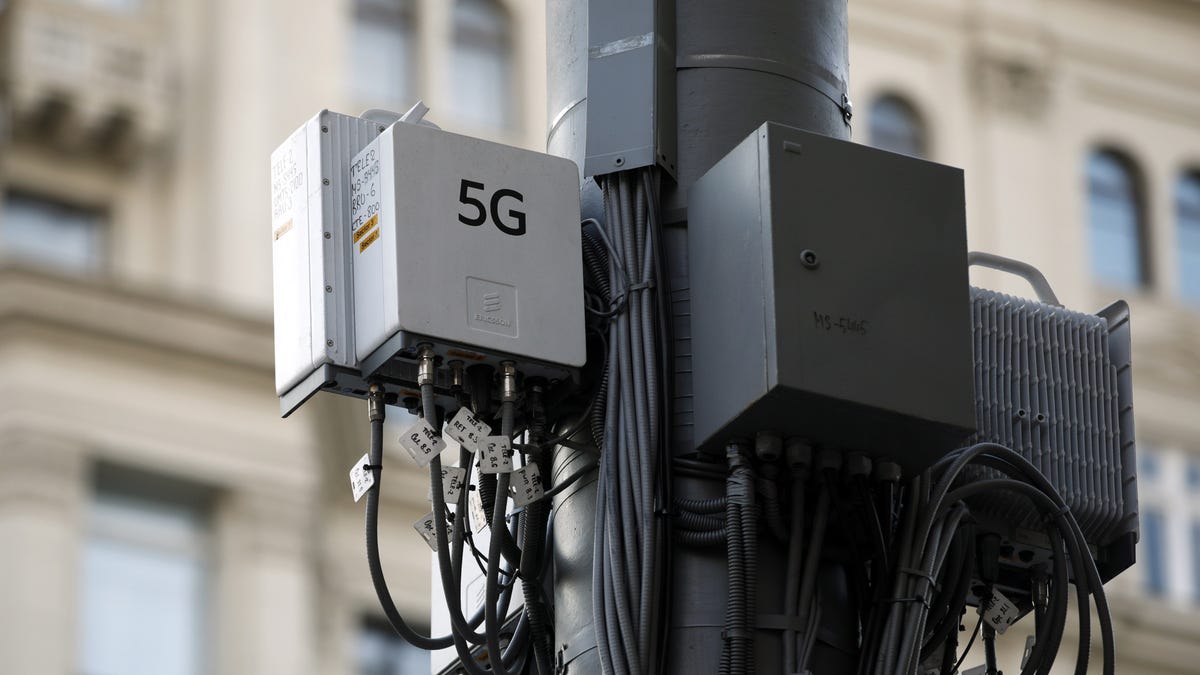Airlines ask FCC to again delay C-band 5G rollout near airports beyond Jan. 5
The Airlines for America association says 5G signals could disrupt flights and urges the FCC to delay C-band rollout until more testing can be done.

The rollout of 5G wireless hasn't been smooth.
Airline companies filed an emergency request with the Federal Communications Commission Thursday, asking to further delay the rollout of new 5G wireless service near airports until further studies can prove the signals won't disrupt critical airplane instruments.
Airlines for America, which represents 11 US passenger and cargo airlines including Delta, United, FedEx, UPS, Southwest and American, called on the regulatory agency to delay approval for 5G rollout near dozens of the country's busiest airports, such as Dallas-Fort Worth in Texas, John F. Kennedy in New York, Chicago O'Hare in Illinois and San Francisco International in California. AT&T and Verizon previously agreed to delay plans to offer the new 5G service, which uses what is known as C-band airwaves, to Jan. 5.
"The Commission failed to provide a reasoned analysis that realistically and properly addresses the documented concerns of the aviation industry," the trade group wrote in its filing, which was earlier reported by Bloomberg. Airlines have expressed concern that some 5G signals could interfere with radio altimeters, which use similar signals to measure how far above the ground an airplane is at any given time.
Airlines for America further said that if the FCC doesn't act by Jan. 3, it may sue, seeking intervention by the courts. Airline executives earlier this month threatened to divert or cancel flights in the affected areas, potentially affecting hundreds of thousands of passengers.
"It would be a catastrophic failure of government," United Airlines CEO Scott Kirby told reporters, according to Reuters.
Wireless lobbyists, such as Jonathan Adelstein, president and CEO of the Wireless Infrastructure Alliance, have argued that a number of countries overseas use C-band and similar airwaves for 5G with no flight issues.
"The ability of 5G to operate safely in the C-band is already confirmed by real-world experience around the globe," Adelstein recently told Inside Towers in response to Kirby's comments. "If wireless was a legitimate reason, he'd already be canceling all United flights to Europe where they use the same frequencies."
Verizon and AT&T referred requests for comment to the CTIA wireless trade group, which didn't immediately respond to a request for comment. In the past, the wireless industry has said it will take precautions to make sure 5G doesn't interfere with aircraft sensors. Carriers, along with experts from the FCC, have additionally said there are no serious interference issues.
The airline industry's FCC filing is the latest in a series of efforts to slow C-band 5G deployment. The trade group said that while it supports most efforts around this technology, it hasn't been sufficiently convinced the new cellular signals won't interfere with aviation equipment. It noted that airline companies have "repeatedly raised" concerns over the past year and a half that it says have not been addressed.
In November, the FAA warned about potential interference between key cockpit safety devices and cell towers on the ground transmitting 5G signals. And earlier this month, the FAA issued new directives to the airline industry warning that interference from 5G signals using the C-band spectrum could result in flight diversions, but the agency didn't quantify the impact.
For everyday users, the new 5G C-band is expected to offer faster and wider-reaching signals, improving on the relatively short range of higher-speed millimeter-wave 5G and providing speedier connections than the 4G LTE-like low-band 5G. Wireless companies are promoting 5G as both the next step technologically and a critical update offering faster internet speeds and reliability.
Verizon, AT&T and T-Mobile dominated the $81 billion auction for C-band earlier this year, shelling out to acquire the highly valuable spectrum. Prior to the FAA objections, Verizon and AT&T had hoped to have already started turning on C-band 5G in 2021, while T-Mobile plans to tap into the spectrum at the end of 2023.
The airline industry has faced criticism for raising concerns at such a late stage in 5G deployment. "The FAA position threatens to derail the reasoned conclusions reached by the FCC after years of technical analysis and study," said an earlier letter sent to the current FCC chair and signed by Republicans and Democrats. The former chairs who signed on were Ajit Pai, Tom Wheeler, Mignon Clyburn, Julius Genachowski, Michael Copps and Michael Powell.
The Biden administration is working with the FCC and the aviation industry to resolve the issues.



